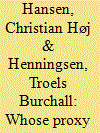| Srl | Item |
| 1 |
ID:
190296


|
|
|
|
|
| Summary/Abstract |
If the International Criminal Court (ICC) manages to prosecute Omar al-Bashir, Sudan’s former president, for war crimes, crimes against humanity and genocide it will be because the new Sudanese regime arrested and extradited him. African parties to the ICC, who had a legal duty to detain al-Bashir, avoided or refused this dramatic step and instead made a regional commitment to shield him. This article analyses the question of non-cooperation in relation to the most basic challenge facing African governments: their survival. Drawing on the notion of the ‘gatekeeper state’, it theorises three sources of regime security, which variously converge and conflict: border control, domestic alliances and international support. Cooperation with the ICC may yield international support, while contradicting or undermining border control and domestic alliances. A case study of Chad’s non-cooperation illustrates the framework and the dynamic interplay of the sources of regime security that cause shifts between cooperation and non-cooperation in African gatekeeper states. More generally, the article demonstrates the merits of analysing African non-cooperation in the context of a dynamic politics of regime survival.
|
|
|
|
|
|
|
|
|
|
|
|
|
|
|
|
| 2 |
ID:
186968


|
|
|
|
|
| Summary/Abstract |
How do state sponsors of proxy groups in civil wars balance their support of non-state militias with the need for political transition towards stability? This article explores the inconsistencies in Iran’s priorities and proxy strategy that at times limited Iranian influence, and complicated Iraq’s transition from war to peace. It expands on current theories on proxy warfare by focusing on the impact of diverging interests among foreign policy elites in a sponsor state. Three policy dilemmas illustrate the difference among on the one side the Revolutionary Guard and on the other side the Ministry of Foreign Affairs and Ministry of Intelligence. First, whether the pro-Iranian proxies should maintain their influence after the war or Iran should strengthen its link to the representatives of the formal state. Second, whether repression by Shia militias or political reconciliation should prevent Sunni Arabs from (re)joining Islamic State. Third, whether Iraq should be part of a sectarian, transnational alliance or an inclusive state that might become an arbiter to deescalate regional tension. The study contributes to the literature on Iranian proxy warfare in the Middle East and proxy warfare literature in general, by considering the consequences of differences among foreign policy elites.
|
|
|
|
|
|
|
|
|
|
|
|
|
|
|
|